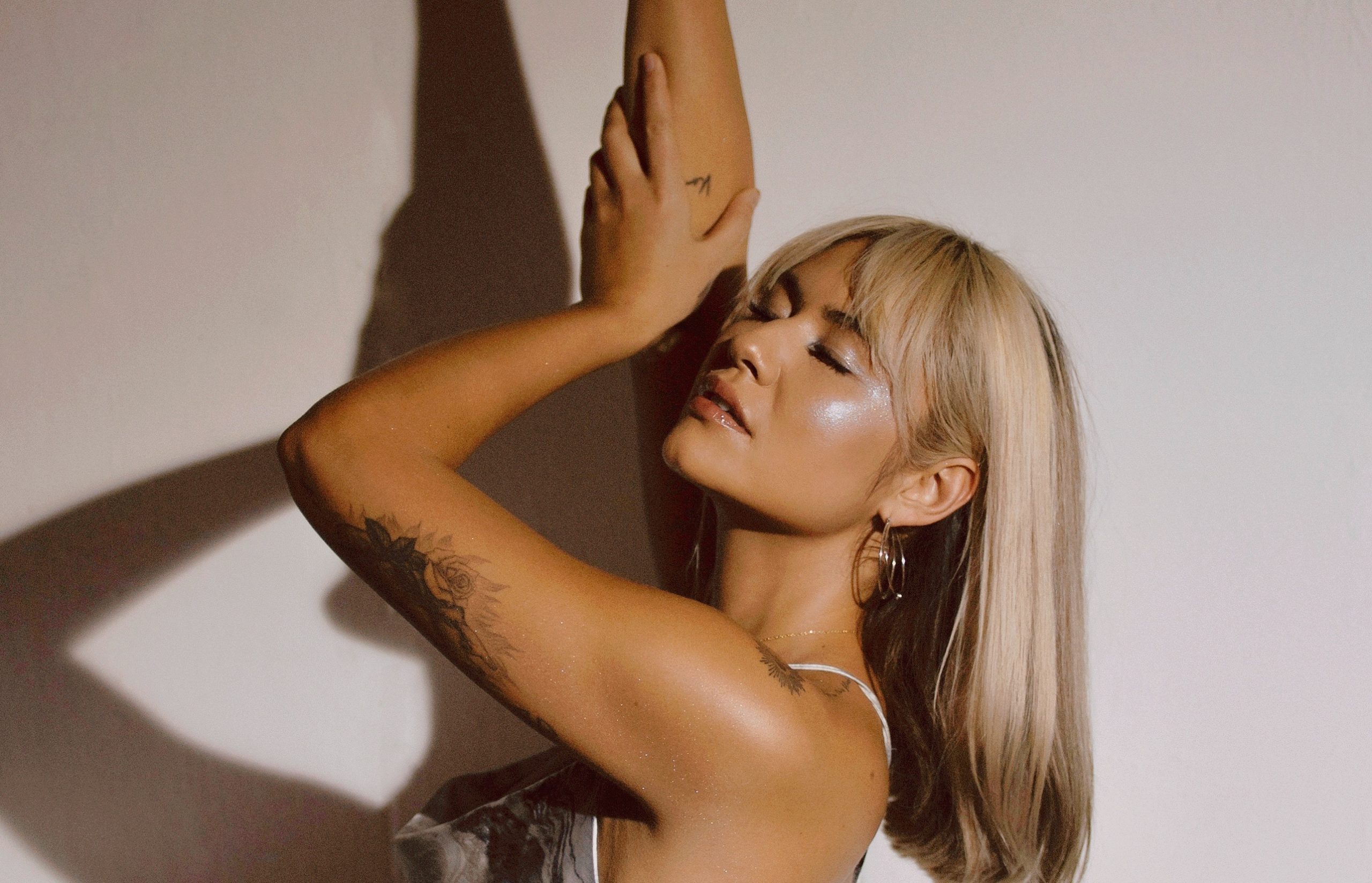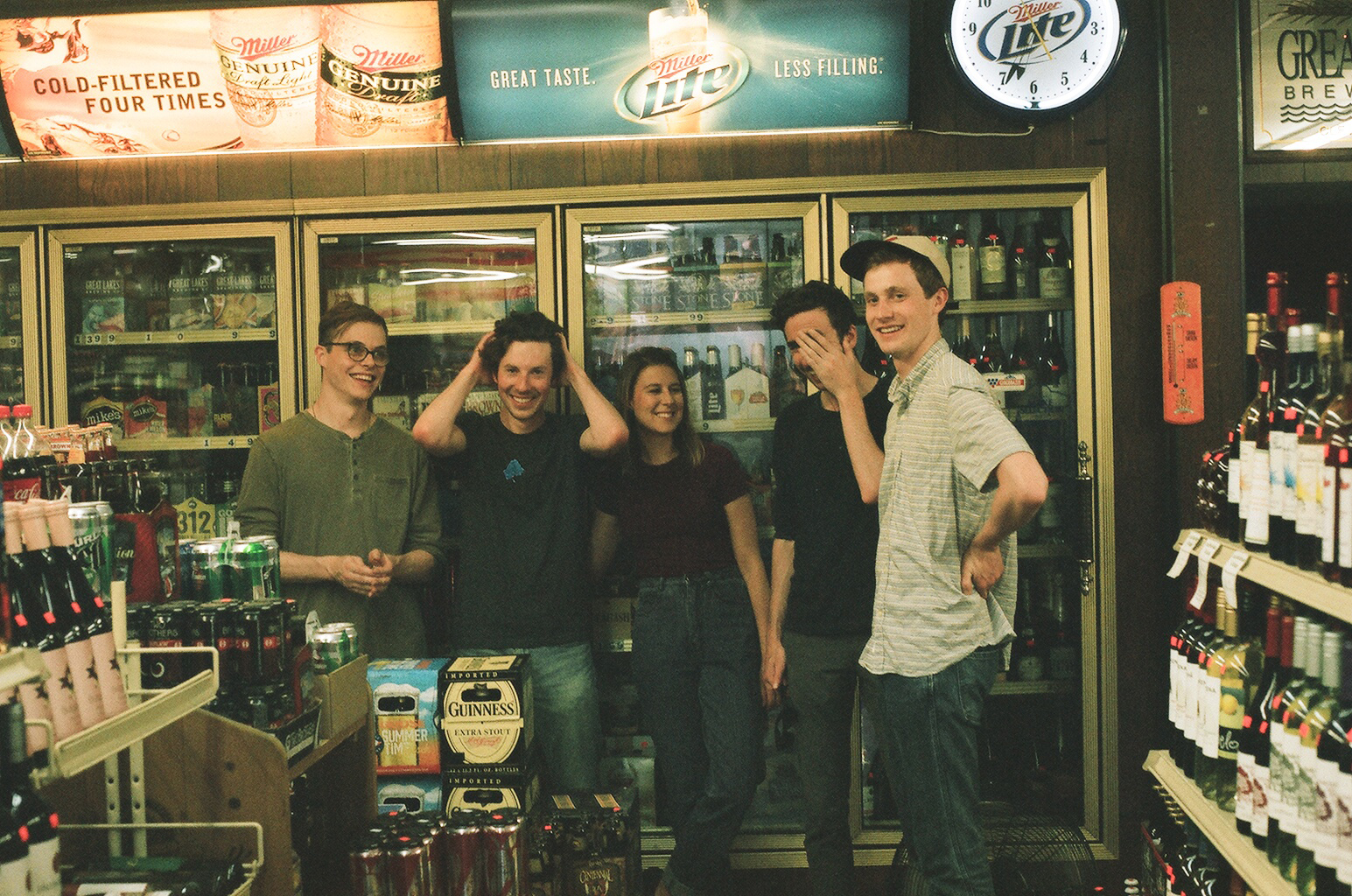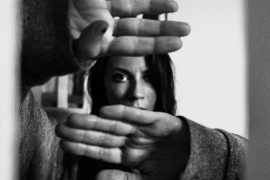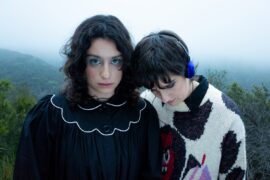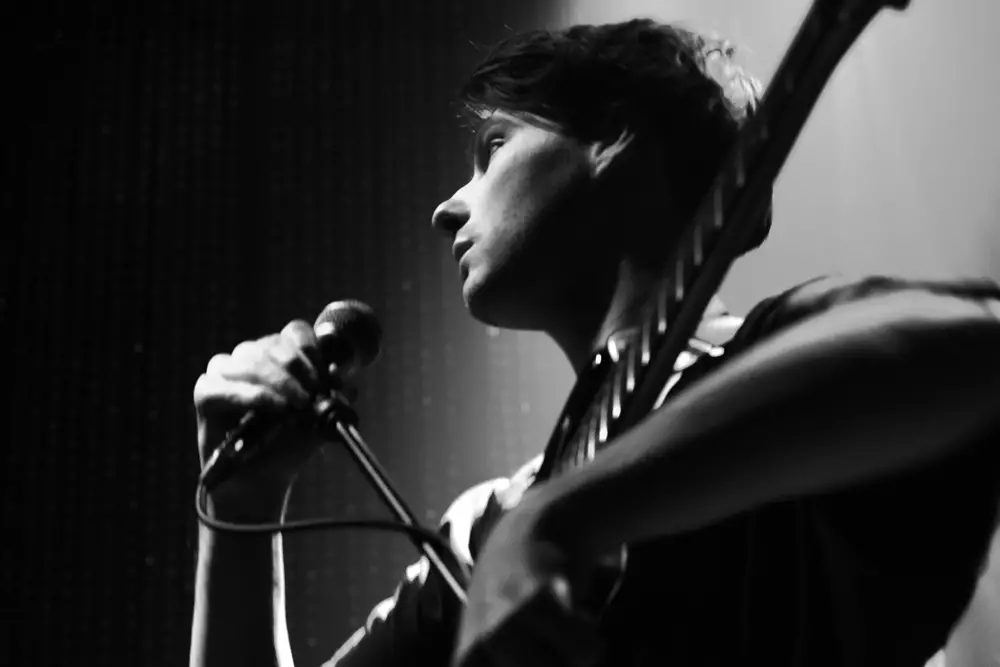Black Honey’s Izzy Bee Phillips discusses the band’s unapologetically vulnerable and hard-hitting new album ‘A Fistful of Peaches’ in an intimate conversation about navigating mental health and ADHD, embracing “crusty rock n’ roll,” counteracting the stale pale males of music, and staying honest and true to herself.
Stream: ‘A Fistful of Peaches’ – Black Honey
The way that I can now access my own feelings and emotions does feed directly into my art, and those are all skill sets that I’ve had to learn through lots of extensive therapy.
Visceral, unapologetically vulnerable, and utterly breathtaking, Black Honey’s third studio album is one radiant, raw reckoning after another.
A turbulent indie rock fever dream, the twelve songs off A Fistful of Peaches dive deeper and hit hard than anything the Brighton-based four-piece have ever made before, and that’s truly saying something: Ever since they debuted in 2014, the band – currently comprised of lead singer and guitarist Izzy Bee Phillips, guitarist Chris Ostler, bassist Tommy Taylor, and drummer Alex Woodward – have been a beloved staple of the UK’s indie scene. Atwood Magazine‘s Lindsay Call praised Black Honey for “embracing their true inner weirdness” and creating their own uniquely cinematic world in 2018’s self-titled debut album, a musical joyride “by way of pop and good old-fashioned rock n’ roll”; three years later, their sophomore LP Written & Directed expanded the band’s universe and tightened their sound, all while delving ever-deeper into themes of identity, womanhood, survival, and struggle.
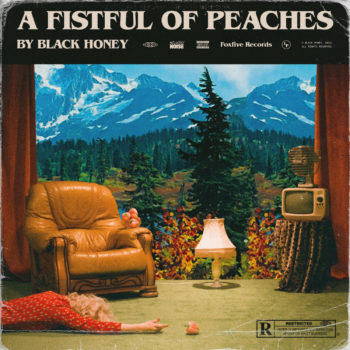
Released March 17 via Foxfive Records, A Fistful of Peaches presents Black Honey at their most intimate and their most intense. It’s a no-holds-barred hard record of confrontation and catharsis – the musical equivalent of holding a mirror up to life and going, “What the fuck is going on?“
Your head is running a thousand miles an hour
And you know so many things
But you don’t even know your power
School isn’t the be all and end all
And everything you do
isn’t always something that you care for
And it gets easier I promise
And other kids can be brutal so don’t get upset
And it’s okay to not know yourself yet
But in time I guess you’ll feel alright
And it’s okay to not feel like everything’s fine
And every time you wanna say this is not enough
But this time you’re gonna be unrealistic
And expect like someone’s gonna show up except you
– “Up Against It,” Black Honey
“Most of this record is me trying to figure out where the line is between normal mental health and when you’re having breakdowns every day that then become part of normal,” Izzy Bee Phillips explains. “I thought everyone cried everyday, I thought everyone had traumatic flashbacks and nightmares. This album is like, ‘What the fuck? I didn’t have to have that?!’ It’s like opening a new door to a future that I didn’t think possible, but it’s also soured by the realisation that I had to suffer through so much that I shouldn’t have had to. I don’t know what I’ll make next, but it won’t be where I was when I made this.”
Few artists, especially in the rock realm, talk so candidly and honestly about mental health. In contrast, A Fistful of Peaches is an open book: “My highs like a deadweight, lows just like a freight train, holding on so tight,” Phillips sings in the epic, grungey upheaval, “Heavy,” addressing her own experiences with grief. “Serotonin let us down, don’t wanna watch the white horse drown. Never-ending therapy ’cause my head is the enemy.” The song’s chorus and breakdown continue to pick apart Phillips’ visceral emotional response:
Baby, pick me up, I feel so heavy
Don’t think I can fake it anymore
Walked into the room as things got messy
Still heavy on my bedroom floor
Maybe this time I’m done
Attention deficit ten tonnes
Maybe this time I’m done
Attention deficit ten tonnes
“We wrote this song the day I found out the founder of our fan club passed away from COVID-19,” Phillips explains. “We were talking about the weight of grief and the way it holds you down, about the parallels between grief and depression. The weight of mental illness and how it brings you a deeper understanding of grief. There’s always a glimmer of light though, and I love how ‘Heavy’ has that kind, glitter darkness. It’s in my nature to become codependent, and I think in this song I’m reaching for someone to help me climb back out. I talk a bit about The NeverEnding Story, as it was my first dialogue with death and depression as a child. Watching Artax the horse getting swallowed by the nothing whilst Atreyu screamed helplessly from the edges of a swamp really spoke to me.”
From the album’s churning, opener “Charlie Bronson” and the urgent, angsty eruption “Up Against It,” to the heart-on-sleeve “OK” and the searing “I’m a Man” – an emotionally-charged song about sexual assault, in which Phillips sings from the perspective of the male assailant – A Fistful of Peaches pierces the ears and the heart in one fell swoop. Anxiety runs rampant on Atwood Editor’s Pick “Out of My Mind,” a song that aches for relief and escape from one’s own head whilst going on a musical roller-coaster ride – a cacophonous blur of anthemic guitars, thunderous drums, and Phillips’ own cinematic, soaring vocals.
Phillips’ personal favorite song is the feverish and heavy “Rock Bottom,” on which she asks, “Am I still breathing? I’m not sure. Rock bottom and the floor keeps dropping…” “When you feel like shit, it’s really hard to verbalize when you are like your worst,” she explains. “I think like there was points in lockdown where I was like, ‘I can’t even fucking brush my teeth. I don’t care about anything anymore.’ But also being so disassociated with everything, and being over Netflix-ed, and over-screened, that you just kind of became a zombie, an anxious zombie. That’s what ‘Rock Bottom’ felt like.”
Plug my head in, I’m checking out
Crawling skin, it feels like static
Nothing real to talk about
Every thought is problematic
Am I still breathing? I’m not sure
Rock bottom like before
Am I still breathing? I’m not sure
Rock bottom and the floor keeps dropping
Black Honey know better than most how to marry passion, pain, and perspective; dreams and reality; raw, fervent rock and spirited, catchy melodies. Yet never before has their music felt this raw and resonant. “The way that I can now access my own feelings and emotions does feed directly into my art,” Phillips explains. “And those are all skill sets that I’ve had to learn through lots of extensive therapy.”

There are more nuances that you can explore in vulnerability by using powerful sounding riffs and stuff… Idyllic bliss is always textured in conjunction with ten other feelings that you’re having to manage.
A Fistful of Peaches dives deeper than Phillips and co. have ever gone before, and the result is Black Honey’s heaviest, heartiest, and hardest-hitting album to date.
Such a massive endeavor deserves an honest and in-depth exploration, and that’s exactly what it got: Izzy Bee Phillips spoke to Atwood Magazine about her most vulnerable album yet in an intimate conversation about navigating mental health and ADHD, embracing “crusty rock n’ roll,” counteracting the stale pale males of music, and being unapologetic in everything she does.
“Now I’m better, but I’m not like fixed or whatever,” she shares. “I’ll have my problems for the rest of my life, but at least I managed to process. [Writing A Fistful of Peaches] helped me process… And then if you can look at it externally, it’s like looking at yourself as a sort of study, to try and learn something. I think that got some things off my chest, and I hope that other women and marginalized people feel like they could hate themselves a little bit less, if they listen to this record. I wouldn’t expect that of them, but if they did that, it would feel fucking great.”
“And it would also feel like great if I could make someone have, or be part of someone’s peak era. Like a lover coming out, coming up, first kiss; to be like landscaped into those parts of people’s lives from my perspective is special. That’s when you know you’ve done something right.”
Seismic and cinematic in scope and scale, yet intimate and raw by nature, A Fistful of Peaches is an emotionally nuanced indie rock masterpiece. Stream the full record wherever you listen to music, and learn more in our heart-to-heart interview with Izzy Bee Phillips below!
This is where it’s time to rewrite history a little bit, and be like, ‘You know what? There are some queer as fuck, neurodivergent people out there who would absolutely love a massive riff and want to feel like someone’s honoring their perspective!’
This is a song for the weirdos, the anti-heroes
Won’t fit in if you tried
A song for the freaks and the scumbags,
the good kids gone bad
Live wild on the outside
As heavy Marlboro red
You’re wondering who’s your friends
This is a song for the weirdos, the anti-heroes
Won’t fit in if you tried
– “Weirdos,” Black Honey
— —
:: stream/purchase Black Honey here ::
Stream: ‘A Fistful of Peaches’ – Black Honey
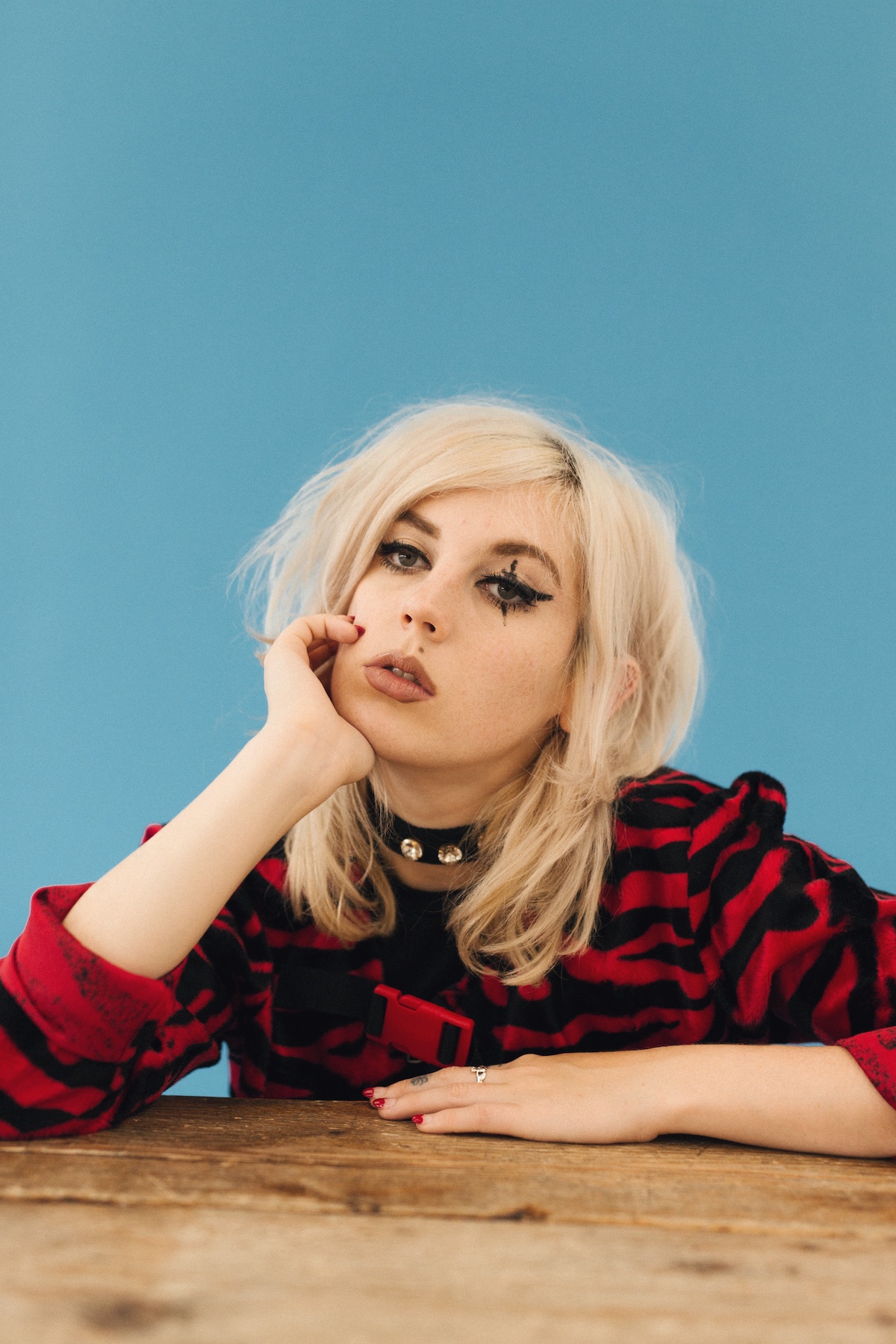
A CONVERSATION WITH BLACK HONEY‘S
IZZY BEE PHILLIPS
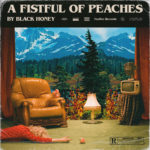
Atwood Magazine: Izzy, I've been sitting with this album for quite a long time now. Black Honey have released two more albums up to this point in time, so I have to imagine some parts of the album release cycle get easier over time. What does this album release mean to you?
Izzy B. Phillips: Well, releasing albums is always stressful. Writing the album is fun, releasing it is hard. And it’s like, I think it’s nervous more than usual this time because I feel quite vulnerable. It is your feelings at the end of the day. It’s like your inner thoughts going out into the world. And sometimes it’s almost like you’re scared that if everyone listens to it, then everyone’s going to hear it. But also you’re scared because, “What if no one cares? What if you unveil everything and literally no one gives a shit.” That, I don’t know what’s worse, too many people, or not enough. [laughs]
You've never shied away from being vulnerable in Black Honey songs, but A Fistful of Peaches dives deeper than you've ever gone before. Can you share a little about the story behind this record?
Izzy B. Phillips: Yeah. In Black Honey I’ve always identified as being a villain and creating this sort of narrative around empowerment behind that, and sort of redefining and rewriting what it is to be a woman. And so that has been a whole identity that I’ve built for myself. And this time, I was just like, “Well, what happens if you took the superhero costume off? What’s underneath all of that?” So, I’m just enjoying the fact that I’ve learned that at the bottom of everything, I just kind of like crusty rock n’ roll. But also, the way that I can now access my own feelings and emotions does feed directly into my art. And those are all skill sets that I’ve had to learn through lots of extensive therapy.
I don't normally associate vulnerability with high energy rock.
Izzy B. Phillips: No, no, neither do I… Although maybe I do. Maybe that’s what I’m trying to do new about it or something. I think everything has more dimension… Feelings aren’t just linear and mono. Feelings are layers and stacks of different things. And that’s why music’s useful, because you can be like, “This song is about being a flawed hero, or being a hero and being flawed,” for someone, and trying to save them and rescue them, but ultimately feeling you are as fucked up as they are. But then this isn’t okay, I’m thinking about it specifically.
But then you can make the sounds so it’s uplifting and it feels like it’s also got more dimension to it than just that. There’s an undercurrent, there’s a bass line. So when you’re happy it’s like, I always think my happy place is when I’m walking my dog. And I think this is happy, but this is happy in this slither between being pissed off that I’m late, tired, needing caffeine, and having an itchy neck. That’s where I feel happy. And this as well, it’s in conjunction of so many things. So I guess, what I’m rambling around the subject of is discovering there are more nuances that you can explore in vulnerability by using powerful sounding riffs and stuff.
There are more nuances that you can explore in vulnerability by using powerful sounding riffs and stuff.
I know what you mean; happiness can be fleeting. I very much identify with the idea of walking my dog and how can be such an emotionally convoluted activity.
Izzy B. Phillips: Yeah. And just like, idyllic bliss is always textured in conjunction with ten other feelings that you’re having to manage.
What kind of dog do you have?
Izzy B. Phillips: A Japanese Spitz named Zero. In The Nightmare Before Christmas, Jack Skellington has a dog – a ghost dog and she’s called Zero. Mine looks like Zero, the ghost dog, she’s white and fluffy.
That's so sweet. I just watched The Nightmare Before Christmas on Christmas this past year, thinking it was a Christmas movie. Not the biggest mistake, but...
Izzy B. Phillips: This is the debate of history. Is it a Halloween movie or is it a Christmas movie?
Why not both?
Izzy B. Phillips: When is it appropriate to start watching Nightmare Before Christmas?
I don't think it's ever appropriate to stop watching it. And yet we're in March and I wouldn't put it on right now.
Izzy B. Phillips: No. If you did, I might judge you. I might be like, “Hmm. Bit of a choice. Bit of a rogue choice.” I need to have stamina to survive Christmas. Also, I think I have PTSD from working in a vintage shop in the era of the explosion of vintage Christmas jumpers. And it is enough to make you want to never see a Christmas tree or a sparkly bit of tinsel ever again.
Have Black Honey ever had a holiday song, a Christmas song?
Izzy B. Phillips: We’ve had to do bloody loads of pitches for annoying corporate ads, who call you when you’re in the middle of tour and make you stop everything that you’re doing on the road and submit a song where you have to do a cover of The Ronettes, but compete with The Ronettes on The Ronettes, oh dear. So it never lands. And then you end up wasting loads of time you could spend sound checking on tour, fucking about with their bullshit stuff. So yeah, I’m not biggest fan. But I did a cover once of, “Walking In the Air,” but we never released it. And we’ve got a few others in the back catalog that are all just from Christmas ad pitches basically. Kill me. Literally, this is not the life I designed.
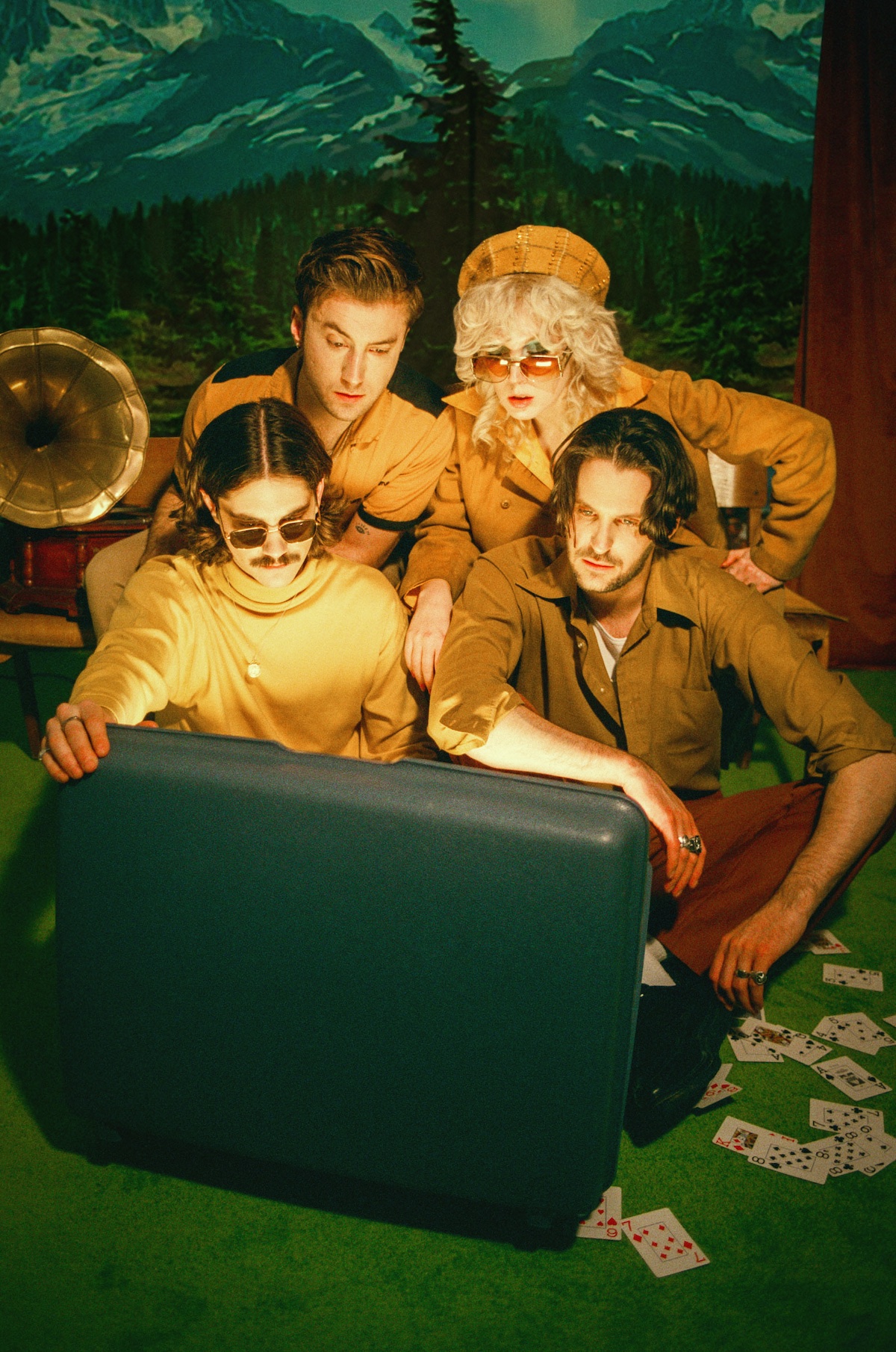
I hear ya. Getting back to the new album, we were talking about how vulnerability isn't always the first thing you think of when you talk about rock music. Rock is its own special space where I feel like there really hasn't been a lot of that, so I really appreciate that you're bringing that vulnerability to rock n’ roll.
Izzy B. Phillips: Rock n’ roll has the most annoying stack of rules. I’d say it’s like, it’s not quite metal in that way, but it’s pretty exclusionary in terms of like, it’s basically, we call it the “stale pale males.” And I guess where stale pale males are dictating, those kinds of things, you wouldn’t be having maybe that much of an extended repertoire of feelings. And I think that this is where it’s time to rewrite history a little bit, and be like, “You know what? There are some queer as fuck, neurodivergent people out there who would absolutely love a massive riff and want to feel like someone’s honoring their perspective!” It feels really exciting for me.
What's the opposite of the stale pale male?
Izzy B. Phillips: I liked to call our genre for a bit VAG rock, to kind of kick back at “Cock Rock.” That was an era…
I love it. You were quoted as saying most of this record is you figuring out where the line is between normal mental health and having breakdowns every day. And firstly, I hope that creating this record helped you in some ways. But I also wanted to ask what that experience was like, putting so much of yourself into music that you knew was going to go out into the world?
Izzy B. Phillips: I think I’ve always done it, and I think, yeah, it’s more like just this time I’ve just had the balls to be like, “This is my truth and where I’m at.” And kind of like relinquishing the shame around the lack of function that I have in a day-to-day situation and why I have this unending and unquestionable desire just to create false fantasies to exist in. ‘Cause I would give all of my creativity back to function “normally” – I don’t know what normal is – but to kind of function in the society that we have. And it’s like for anyone that is maybe on a sort of learning difficulty spectrum or autism spectrum, I think that it’s quite a tricky place to exist. And all the time, I thought I was the problem, but it’s like, no, it’s just different brains and how they function, that everything isn’t designed for you. And so, I guess, getting in touch with those things is important. Well, I have always kind of done it, but with more of that fantasy protection villainess.
I think I spend a lot of time turning myself into more of a male gaze kind of female, for probably longer than I would be comfortable with. I think like this new sort of commentary around gender expression has sort of given me a bit more of my artistic license to be myself in like… And in life, be myself.
I have to say as somebody who grew up with attention deficit disorder, your words really do resonate. It's nice to have somebody openly talking about this kind of stuff.
Izzy B. Phillips: I think everyone likes to find ADHD as the funny one. It’s like that – you’re probably charismatic and you’re a bit of an idiot, but it’s sort of charming, but they don’t see the meltdowns, they don’t see the sensory overwhelm, they don’t see the sort of like, “I’m getting tested for autism, but I don’t know if I have it, but I have all of the crossovers.” And that’s shit. It’s just fucking day-to-day bullshit though, it’s really, really hard. And it’s crazy to be in at this age now, and be like… I was lucky because I presented young, and I don’t… I think did you… Happy you presented young, presumably? ‘Cause you were in trouble at school, right?
And then, and I weirdly feel lucky. Do you get this, where I haven’t been a late diagnosed person, especially in women? And all of these people now are getting diagnoses. I’m like, “Fuck. Okay. I’m pretty sure that a lot of these people don’t have the same experience that I have. But that doesn’t mean I should not respect their experiences, and also it doesn’t mean I should devalue their diagnosis.” I need to acknowledge that ADHD is so varying as well as a spectrum, as much as autism is a spectrum, and there’s very different needs that exist in that, and there’s a lot of people that can function in society and can function normally.
And weirdly, I feel lucky that I am in the more extreme end, because I had help. And by help I mean it was minimal, it was classic, like… I had a card, which was a get out of lesson free card, which felt like the best thing ever at the time. But it was like, so I could go to see this lady. And if I used the card, I’d have to go to the lady’s room, and then the lady would make me fill out this form and it would be like, “John has a sad face. Remember the last time you had a sad face and why?” [laughs] I was just like, “What the fuck’s this?” But it’s better than crying and screaming in a class, ’cause that was really stressful, having meltdowns in that space.
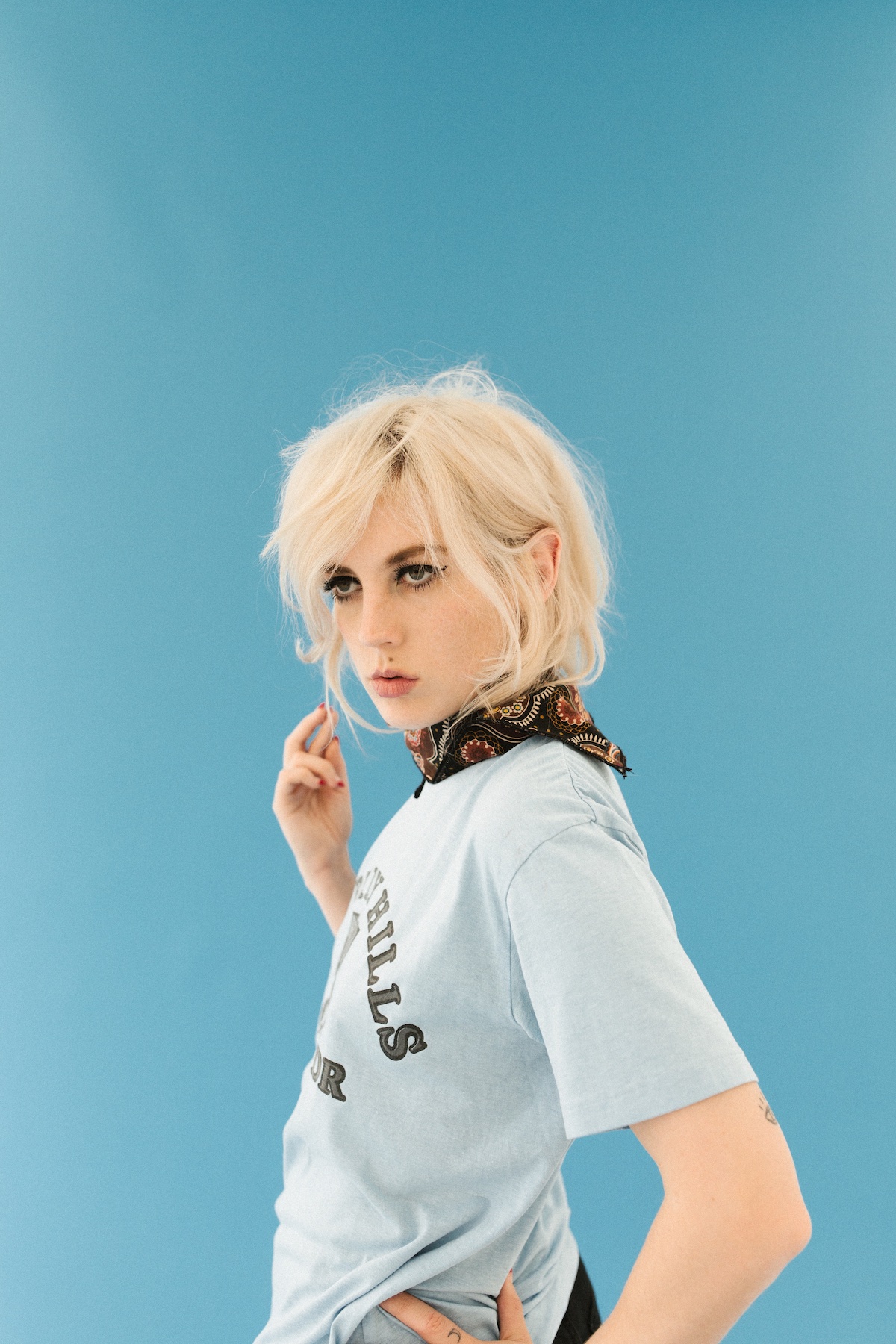
We had the tools, we learned the tools to handle ourselves at an early age. Whereas if you're in your adulthood and you're dealing with real life and also dealing with these things that are inhibiting you or that you think feel like they're holding you back, you have to deal with everything all at once. It's never as easy as it is to tackle when you're a child and you've got guardians, parents, teachers who are able to help and give you those tools to succeed.
Izzy B. Phillips: Yeah. And also there’s a structure. And I don’t know how you feel about structure, but I feel very comforted. My school providing me with the structure. Okay. I can break it, that’s fine. But I feel very secure in that space. And in unstructured space I kind of get flustered and panic, and I don’t know what to do. And so I think like adulthood and childhood, very different like that. And I don’t know if you have it as well, but I had this ongoing thing where… Did you get told when you were younger that you would grow out of it at one point?
Oh yeah, 100%.
Izzy B. Phillips: Yeah. And I just keep thinking, “I’m just gonna grow out of it soon.” In mid 20s, I’m still like, “Hmmm, doesn’t seem like I’ve grown out of it still.” And then remembering like… And then sort of learning via the internet’s brilliant resources of education that the grow out thing is kind of mythical. It’s more like people who learn to manage it in adulthood can cope with adulthood. And whether that’s solving the problem or not is a different thing. But it’s like you don’t cure, it’s not cured, you don’t grow out of it. There was me thinking it was puberty. I was like, “This is weird,” like a period. Thinking it was gonna be a period that just ends. [laughter] I don’t know.
For me, I’m having this wide, wide awakening of obsessive note making and listing. My lists are the only thing that can keep me anywhere near the track that I need to be on. And it’s becoming my go-to, every day I’m like, “Oh, I feel so nervous.” I’m like, “I know I’ve gotta do stuff, but I don’t know what to do.” And I just go to the list. And then every day I have a list, and it’s like, “Shower. Walk the dog. Do a yoga lesson.” It’s like the idiot shit stuff. “Drink water, eat, do press, do the TikTok videos, fucking write.” And it’s obvious maybe to a lot of people, but unless I have a list for the day, I just fucking… I’ll just wander around getting bored. Probably I’ll end up just shitfaced, drinking tequila on my own. Do you know what I mean? I need to be given something.
You were talking about structures earlier. For this interview, I prepared a list of questions that I haven't even touched on yet, but I had them, and that gave me the comfort going into our conversation. We're talking about Christmas and ADD, but I have them – I have questions about A Fistful of Peaches, they're there!
Izzy B. Phillips: And why has it taken me ‘til I’m in my 30s to be like, “Oh, I need to do that. I need to do stuff”?! But back when things will only get done when it was life or death. It was like, “I’m gonna lose this flat unless I pay rent tonight.” Whereas nowadays, just each day as it comes in little slithers. And if you try and do too much… If you try and think about what you’ve got to do on Tuesday, that’s gonna fuck you up. That’s just gonna fuck you up. Don’t even think about Tuesday. Do not think about Tuesday. Just think about today.
But you can write it down and you can have it there to reference when Tuesday comes.
Izzy B. Phillips: Yes, exactly, and then it stops the whole getting cripplingly organized for something that you didn’t need to get organized for today, which is totally what’s happened here. I’ve packed a tattoo set for my tattooing that I have on Monday there, even though I haven’t packed any of the stuff that I need for tomorrow. This is why. That’s been there for a week.
Priorities are something else entirely. I do think that adulting gets easier over time.
Izzy B. Phillips: You know where your brain is trying to play games with you and then mess you up. And you’re like, “No. No brain, no.” Like getting out of bed. Now I can’t not get outta bed ’cause my dog is there, so it’s like I’m forced to literally get up at 6:30 every day, which is super useful. ‘Cause I can sleep ’til 2:00 in the afternoon, I’m that kind of person.

Same here – it's so good to connect on this! I haven't done that in a long time.
Back on the music… “A Fistful of Peaches” is a really cool name for a record. I’m imagining something that's both sour and sweet, like “The Powerpuff Girls.” Can you tell me about this album title and what it means to you?
Izzy B. Phillips: Well, I love that you took that from it. A sweet thing is, that’s the identity of Black Honey. And then A Fistful of Peaches is like actually a reference to “A Fistful of Dollars,” but make it camp and make it queer, with the Peaches. And I like the way that it has like a weird sexual violent connotation to it, and it feels a bit challenging. And I like… It was a lyric that I wanted to get into loads of songs. There was like five songs where I was trying to crowbar it in, and then I’ve realized that I’m just so attached to this line, but I couldn’t find its home. And then I was like, “Oh my God, it’s the album title.” And it’s just completely disassociated from all of the songs, but it kind of summarizes them. The visual of the collection of them, feels like the songs are the peaches collected somehow.
The backup title for the album was “Up Against It,” which is cool if you know the song, but if you don’t know the song, it sounds a bit, “Poor me.” Like, “Well. Oh, I have a hard time, up against it.” [laughs]
I will say, listening to the record, the emotion that speaks so much to me – especially throughout the first half of the record – is urgency and angst. There's a lot of that. So, Up Against It actually does capture those emotions.
Izzy B. Phillips: Wow, I love that you feel that, that’s sick. Yes. Urgency is a feeling that I think I talk a lot about in therapy, but I’ve never really thought about in terms of music, so I don’t really know what’s to regard in that connection. But you’re probably picking up on something.
”For
This is technically Black Honey's first full-length album that you wrote in the post-pandemic world. I know Written & Directed came out in 2021, but I have to imagine it was largely written before –
Izzy B. Phillips: – way before. Like literally 2019. Yeah, the only song that was actually in lockdown was “Nobody Knows.” And I think you can tell that ’cause I’m talking about like the planes and stuff being empty, and they’re just being walls. Looking at the same four walls, ghosting of course, sort of. Written on a boring, gray London day.
At the same time, once we went through it, that's a trauma that we're gonna live with for the rest of our lives. Nothing's gonna be the same.
Izzy B. Phillips: I think we’re deleting it. Someone told me the other day, that when something really traumatic happens, you actually look back on your most traumatic time with fondness. And I know loads of people that were like, literally like good friends of mine, that are like, “Oh yeah, wasn’t it so nice in lockdown, not having to do anything?” Well, I just remember thinking, “The fuck are you talking about?” All I wanted to do was go to the pub with my mates, I just didn’t give a shit about anything anymore. I didn’t care. I was like, I hated myself before lockdown more. I was like, I used… In lockdown, I was like, I used to be such a consumer human, just consume, consume, consume. Where’s my next coffee coming from? And then I hated where I was then, now. And I just didn’t know if I was ever gonna be able to do music again. And so nothing was good.
And I just fucking hated the whole thing. And I had probably a comfortable time compared to a lot of people, but… So when my mates started saying that, I was like, “Your brain is disassociating with how bad that was.” Do you remember? I don’t know if you guys had this, but we had the Scotch egg era, we call it. Where basically, Boris Johnson made this rule at one point where it was like… ‘Cause you know we British, we just want to go to the pub, right? And he was like, “You can go to the pub if you order food.” But sometimes, so what people would do is that we would go to the pub and then people would have these 90 drink bar tabs with three Scotch eggs on the bottom. And it was like the scotch egg era of like, “We’re allowed out if we buy a scotch egg.” And that was a peak moment for me, being… That was the first time we were allowed to do anything, before Boris canceled Christmas and everything else, every other lockdown that we had to go through.
I don't know, I can't see myself deleting it or seeing it in rose colored glasses at all.
Izzy B. Phillips: Interesting. I remember the books. I had loads of story books, and I was gardening loads. Lord of the Flies. Like this certain era of novels. Actually shows you how much I tried to disassociate, ’cause I can’t remember the names of any of them. But they were the ’60s short beat poet dude era books. And kind of getting into those other worlds that I had not realized existed yet. So, imagine my fright ending at Alan Ginsburg, and then realizing that there was all this other shit going on. So that was what I think of. But I think of Tiger King.
You introduced this record in the middle of last year with “Charlie Bronson,” which is also the album opener. This song hits hard right from the start, and it sets the tone for the entire album. Can you tell me about this track and where it came from?
Izzy B. Phillips: “Charlie Bronson” is Britain’s most notorious prisoner, and he’s kind of interesting ’cause he… All of his worst crimes were committed inside. I don’t wanna glamorize him or give him too much airtime, but the idea is that, in my mind, I feel like Britain’s most notorious prisoner. And I feel like I can be crazy and psychotic sometimes, and I wanted to explore that in a feminine way, in a way that felt nuanced, or not just being the crazy woman that is in all the films, the crazy one, the crazy ex-wife. I wanted to be like, “No. This is what it fucking feels like inside my head, this is my inner truth.”
Another one that struck me is “OK” – in the chorus you're singing, “I just want you to be okay,” and whether you're singing that about somebody else or about yourself, it's just so out there, honest and raw.
Izzy B. Phillips: Thanks. I think when I think of that song, it’s like, I don’t want you to be like, “Amazing.” I don’t want you to be like, “Great.” I’m like, that’s too much of an ask. Okay. If someone’s just like… If someone ask me how I was doing and I was like, “I’m shitty.” I’d be like, “Fair. Be honest. Great.” But when someone’s in a bad way, we know when someone’s in a bad way, and we’re like, “I don’t want you to be like, ‘Amazing.’ I’m not asking for that. I just want you to be okay. I just want you to be okay.” It’s not rocket science shit.
I think because of it being a conversation around my friend who was smoking too much, and I was just like a bit worried, but also like… Then I’m like annoyed at myself in the songs, I’m like, “Oh, urgh, urgh, I’m being a hero. I’m hypocrite. Why am I trying to be the hero? I’m fucking as flawed as the next person.” But then also feeling, somewhere in that, a bit romantic. There’s also a love song in there. I wanna be Romeo until the end of time. And I love Romeo because he’s just an idiot. He’s the world’s best and most flawed protagonist.

What resonates most for you about this album? Is it the lyrics, is it guitar solos, is it something in-between? What are your highlights off A Fistful Of Peaches?
Izzy B. Phillips: I love the cheesy 2007 indie rock stuff. I feel very unapologetic about that. It’s very uncool to be into crusty rock, but like, “Fuck it.” That’s who I am. As much as I love Nancy Sinatra, and I love Tarantino movies, and I love all of that too. I have this cheese ball side to me that’s unrelentingly obsessed with The Strokes and The Killers, and that kind of stuff. But, yeah, I think the guitars, the guitars also feel quite like the first thing that we would’ve done, which is what? It feels honest. They feel honest.
I love that you call it “crusty rock.” I've just never heard that phrase used before. It's great!
Izzy B. Phillips: ‘Cause also, “crusty rock” should be crustier than the bands I’m describing, right? It should be like, Bon Jovi is like crusty rock, right?
I actually think of The Killers as quite sleek.
Izzy B. Phillips: Sleek and shiny. Yeah. No, crusty is actually older than that maybe. Dad rock. Anything that’s dad rock. But the new dad rock is what I like, which is The Killers and The Strokes, you know what I mean. That’s totally the next era of old folky music.
I can't tell you the number of weddings I've gone to where the last song of the night is “Mr. Brightside” – including my own!
Izzy B. Phillips: Oh my God. Yeah. That song is the most overused song ever, but it’s like the best written song of all fucking time. It’s so confusing, ’cause I’m like, why the fuck isn’t this band English? They sound like they’re an English band, and he sings in an English accent. It’s so confusing. And then the fact that they’re from Vegas as well, I find fascinating. All of it is just a confusing, quite exciting hybrid. And then loving Bruce Springsteen, anyone that’s openly loving Bruce Springsteen has to understand how uncool that sounds. It’s like, the least cool thing you could ever say is like, “I’m a massive Bruce Springsteen fan.” It’s uncool because it’s so not cute to be a Bruce Springsteen fan – it’s like, you have to be a closeted Bruce Springsteen fan.
It does not compute, with our countries having different culture. It’s like, I love it. I love that. But it’s… Oh my God, it’s so lame. Sorry, Americans for English people, a lot of English people are really quite traumatized by some of the ways that Americans communicate. For me it’s one of those sort of sensory overloads when some people just do cheesy stuff, and I love it. I loved it when Macca did it as well, I think it’s great. But it’s still like, “Oh, this is so cheesy. But everyone loves it.” Do you know what I mean? It’s like, “Oh, lame, lame overload. But it’s great.”
I guess we Americans are very open with our feelings. Well, some of us are.
Izzy B. Phillips: And we have bad teeth, so. Look.
Is that the trade-off?
Izzy B. Phillips: Yeah.
I don't see it as a problem, for what it's worth; I feel like it's a good thing. That being said, I would also argue that this album is like that, where you held nothing back. You just spoke your truth. And I appreciate it. Are there any songs that we haven't spoken about that you particularly hope people listen to when they get this album?
Izzy B. Phillips: I hope that the people listen to “I’m a Man.” And can understand what the lyrics mean, which turns out to be quite difficult to translate, because it’s like… The tone of the riff’s quite jollier. And ’cause it’s about sexual assault, but written from the experience of the assaulter, from the perspective of the assaulter. So people tend to miss it because of the riff being quite jolly. But that’s kind of cool, I guess. But I hope people listen to that song. I hope women feel aligned by it or like… I hope it does something for them, I don’t know what. It’s kind of hard to expect it to like undo anything that’s happened to them in their experiences, but also that maybe they feel a bit more seen and helped by something, artistically.
What inspired you to write from that perspective, if I may ask?
Izzy B. Phillips: I think it was easier to do as a critique, like… Do you know the song “Polly” by Nirvana? That song is written from the perspective of a rapist, murderer… I think it might be like Charles Manson or something, that he’s doing the story of. And it’s like, I loved how cryptic it kind of felt, as a kid, listening to that song. And now once you get it, you really understand and it’s sort of like a new way to explore someone’s flaws without finger pointing and waggling and preaching. It’s like, if you take on the persona of the villain, it gives you more license to explore their thoughts, I guess. Or justify their… Not justify their actions, but explore why they would justify them and how they would think that that was permissible behavior.
Right, it's not humanizing; it's trying to understand how somebody could possibly make these atrocities.
Izzy B. Phillips: But it’s also critiquing. The lines that feel powerful for me are like, “When I’m like equal, no such thing is survival. She was holding her drink to her chest like a Bible.” It’s like, “Nah, we’re not equal, this survival.” It’s like, sort of taking on a bit more of an, I guess like a critique of that thought path, and then being like, “She was holding her drink to her chest like a Bible,” is like victim-shaming, it was like her skirt was too short, it was her fault. She held her drink like that. She looked like that. She wore that skirt. She did that thing. And it’s like, “No.” You are the fucking wrong man. And then also being able to poke fun and be like, “Just like a real man in a toupee and a tan, with a face a thumb and a spine like a sponge, sucking out of the fun.” And that one, and I’m just trying to draw a potato drawing of Donald Trump. I don’t know if it comes off, but like real man, toupee, tan, that kind of thing. And real men aren’t that. Real men are humans with feelings, and intimacy, and sadness, and tears, and sensitivity, and vulnerability. And it’s also critiquing like that kind of toxic masculinity that we have been upholding for history.
You really packed a lot into that song. Hearing you explain it uncovers a lot of the mystery of that song for me. Thank you for sharing it. What do you hope listeners take away from A Fistful Of Peaches, and what have you taken away from creating it with your band and now putting it out?
Izzy B. Phillips: I listen back to this album and it’s so funny ’cause I’m like, “God, I sound… ” I’m like, “That bitch is so sad.” That was a sad bitch. And I’m saying that from the perspective of someone that’s not sad anymore. And that’s quite nice. I’m sure I’ll get sad again, but right now I’m like, “Ooh, she was in a bad way.” Now I’m better, but I’m not like fixed or whatever. But there’s no fixing here; I’ll have my problems for the rest of my life, but at least I managed to process. It helped me process them when I’ve made stuff. And then if you can look at it externally, it’s sort of like looking at yourself as a sort of study, to try and learn something. But, yeah, I think that got some things off my chest. And I hope that other women and marginalized people feel like they could hate themselves a little bit less, if they listen to this record.
That’s what I would like. It’s quite a big ask. I wouldn’t expect that of them, but if they did that, it would feel fucking great. And it would also feel like great if I could make someone have, or have be part of someone’s peak era. Like a lover sort of coming out, coming up, first kiss, kind of. To be landscaped into those parts of people’s lives from my perspective is like special. That’s when you know, when you’ve done something right.
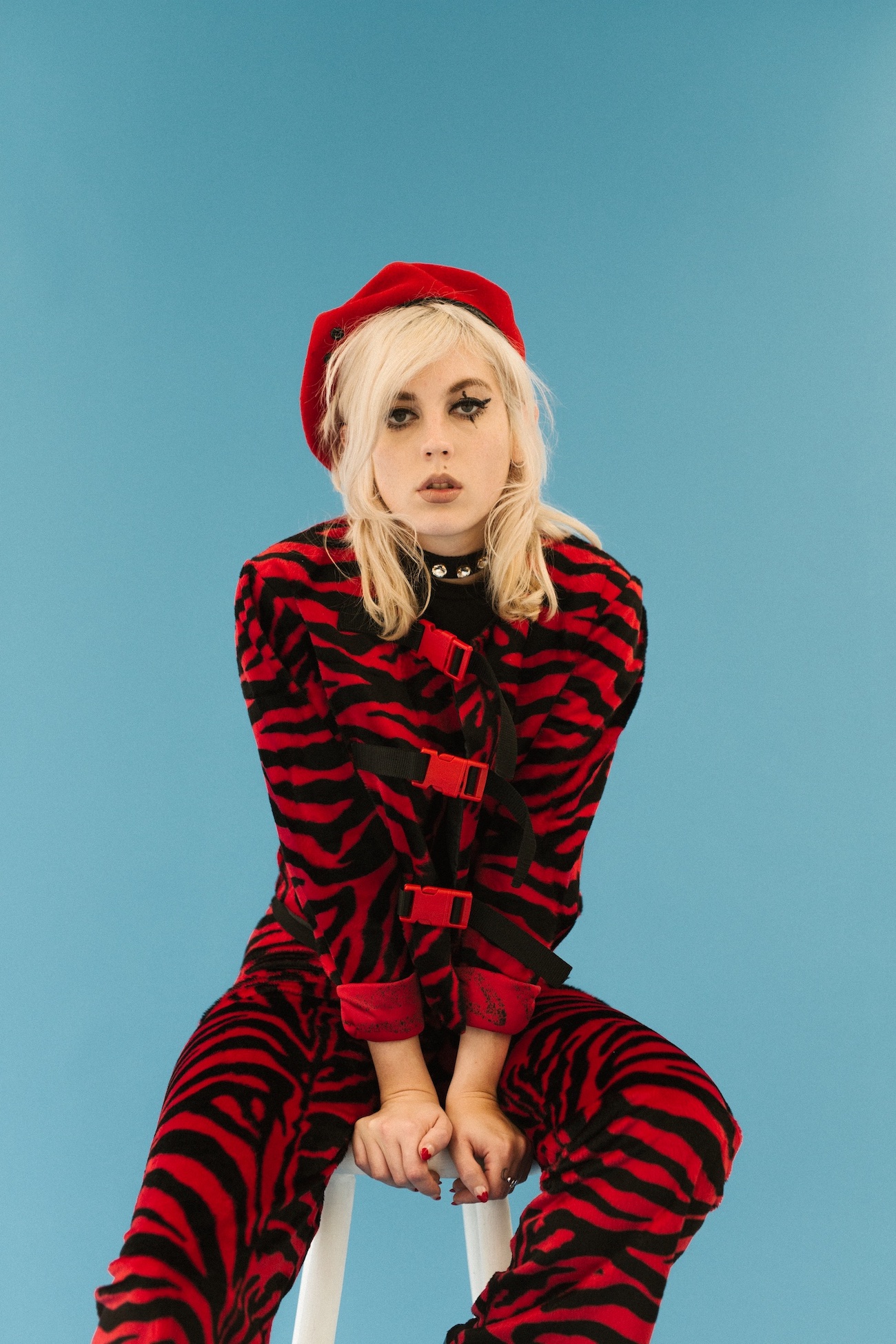
I hope that other women and marginalized people feel like they could hate themselves a little bit less, if they listen to this record. I wouldn’t expect that of them, but if they did that, it would feel fucking great.
Let it be the soundtrack to someone's eyes… or the last song at a wedding. It's really special to hear that writing this record was helpful for you. Has music always been a form of therapy for you?
Izzy B. Phillips: Yeah. Someone told me the other day that they thought that music was my special interest, which maybe it is, but I just think I’m creative, I don’t know. I think I’m just a very creative person. And that’s like, I sort of living in my creativity. I feel safe there. It’s a safe place for me.
But sometimes it’s fucking hard to write a song. Sometimes you’re just tired and like, “Oh, I could put so much of my fucking self in this.” That feeling where sometimes you want someone to hear it and be like, “I just feel seen.” I want them to have the feeling that I have when I first listened to Nirvana. Do you know what I mean? That’s the thing I cannot compare to ever do. But I would love for that. But maybe not as I’m writing it. ‘Cause as I’m writing it, I’m not like, “Ooh, whoa, I feels so great.” I like writing it, and then afterwards I’m like, enjoying that. I’m quite enjoying that, or I’m quite enjoying that one at the moment. Or like, “This is kind of a vibe.” Or “this one feels like it’s not gonna be fun to play.” That’s how I feel.
Who else are you listening to these days that you would recommend to our readers?
Izzy B. Phillips: So, obviously, I’ve been going on about her for bloody three years, but I’m still obsessed with Arlo Parks. And that just feels like, all cliché now, but that’s what I’m really enjoying. And then there’s this new band that I’m really excited, that haven’t launched yet, but I’ve heard some demos and slipped the demos in the music and shit, and they’re called “Mary In The Junkyard.” And they’ve got this amazing sort of candelabra, I think. And it’s so pretty. And I love a band called Bad Nerves as well.
And I’m revisiting Randy Newman at the moment. That’s like my Bruce Springsteen moment! [laughs] But it is really pissing me off with the algorithm, right? Because I keep putting a Randy Newman playlist and then they give me Toy Story. Okay, fine. But then it thinks that I’m interested in Disney, and then I just get sent down like a Disney cave. And I’m like, “I just want the B-side Randy Newman era.” I’m having that section of my life happen.
The algorithm's never gonna work for you in that regard.
Izzy B. Phillips: No. Can I get that on a T-shirt, just written like, “The algorithm is never gonna work for me.”
— —
:: stream/purchase Black Honey here ::
Stream: “Up Against It” – Black Honey
— — — —

Connect to Black Honey on
Facebook, Twitter, Instagram
Discover new music on Atwood Magazine
© Jamie Noise
:: Stream Black Honey ::

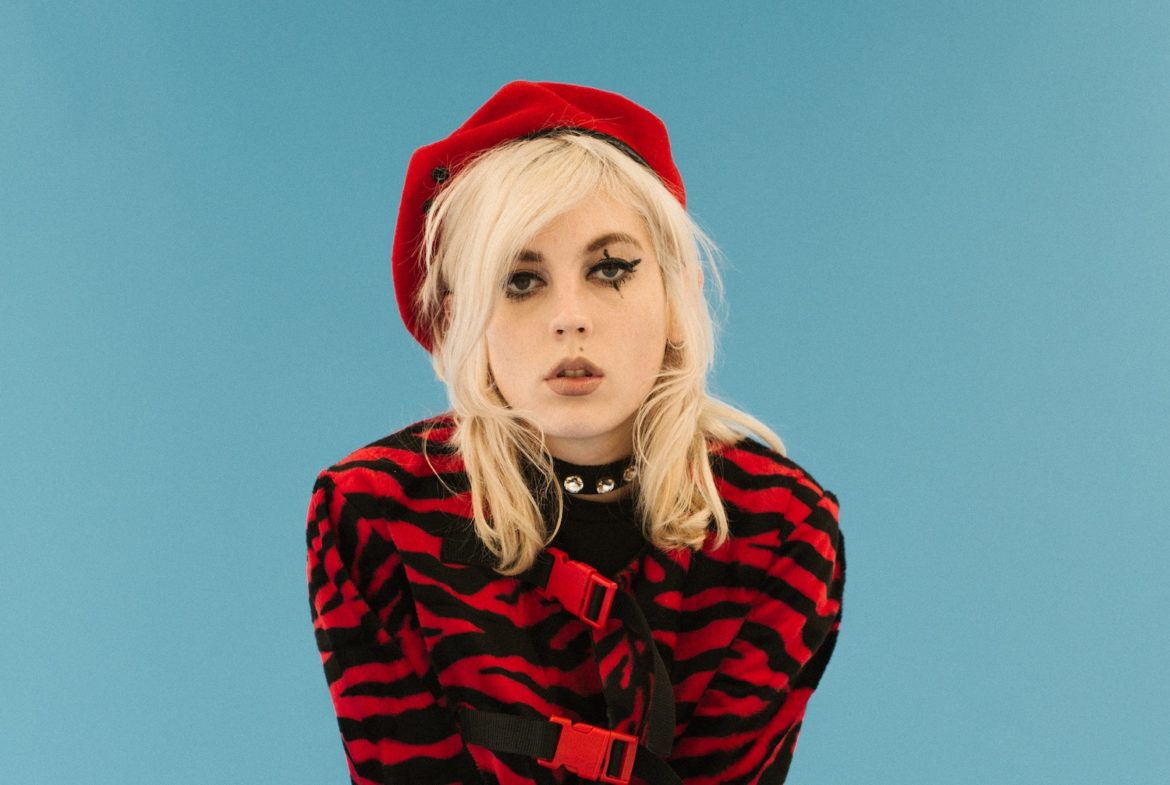
 © Jamie Noise
© Jamie Noise